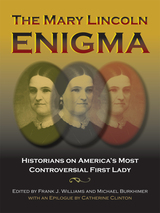
Mary Lincoln is a lightning rod for controversy. Stories reveal widely different interpretations, and it is impossible to write a definitive version of her life that will suit everyone. The thirteen engaging essays in this collection introduce Mary Lincoln’s complex nature and show how she is viewed today.
The authors’ explanations of her personal and private image stem from a variety of backgrounds, and through these lenses—history, theater, graphic arts, and psychiatry—they present their latest research and assessments. Here they reveal the effects of familial culture and society on her life and give a broader assessment of Mary Lincoln as a woman, wife, and mother. Topics include Mary’s childhood in Kentucky, the early years of her marriage to Abraham, Mary’s love of travel and fashion, the presidential couple’s political partnership, and Mary’s relationship with her son Robert.
The fascinating epilogue meditates on Mary Lincoln’s universal appeal and her enigmatic personality, showcasing the dramatic differences in interpretations. With gripping prose and in-depth documentation, this anthology will capture the imagination of all readers.
Univeristy Press Books for Public and Secondary Schools 2013 edition

The core of the book is an alphabetically arranged glossary of words and expressions characteristic of mid–nineteenth century North Carolina, each containing excerpts from the letters themselves to illustrate meaning and usage. While the majority of the writers were Confederate soldiers and their family members, the collection also includes letters from slaves, former slaves, and African Americans from North Carolina serving in the Union Army. The soldiers’ letters rarely contain details about battles, except to list the names of relatives or neighbors among the killed or wounded. After a battle, a soldier might simply write, “the Like of ded men an horses I never saw before” or “we hav lost a heep of men and kild a heep of yankeys.” As Joel Howard of Lincoln County wrote home in June 1863, “I have bin in the ware and Saw the ware and heard tell of the ware till I have got tired of it. if I Could get clear of this ware I neve[r] want to Read of A nother.”
Food is perhaps the most common topic, followed by illness. Numerous terms relate to farming, clothing, religion, and the effects of the war itself, as well as entries for expressions that have long since disappeared from American English: in the gants, on the goose, and up the spout.
In addition to the glossary, Ellis offers an extensive overview of North Carolina English of the period, delves into the social background of the letter writers, and provides invaluable guidance to the ways in which Civil War letters should be read. A unique window into a largely neglected corner of our extraordinarily rich and regionally distinct language, this volume will prove an indispensable reference for scholars and students seeking to reconstruct the world of the common Civil War soldier.
READERS
Browse our collection.
PUBLISHERS
See BiblioVault's publisher services.
STUDENT SERVICES
Files for college accessibility offices.
UChicago Accessibility Resources
home | accessibility | search | about | contact us
BiblioVault ® 2001 - 2024
The University of Chicago Press









